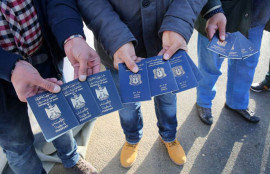1729677160-0/BeFunk_§-(53)1729677160-0.jpg)
The UN's High Commissioner for Human Rights, Volker Turk, expressed deep concern over an Israeli invasion near Rafik Hariri University Hospital in Beirut, which reportedly killed at least 18 people, including four children.
This incident, which occurred on October 21, has heightened scrutiny of Israel's military attacks in Lebanon amid ongoing hostilities with Hezbollah.
In his statement, Turk emphasized that the protection of civilians must be a top priority and that international humanitarian law must be strictly adhered to during military operations.
He noted the hospital's critical role in treating a large influx of patients throughout the conflict, which has now lasted nearly a month.
The attack is part of Israel’s intensified military campaign in Lebanon since late September, aimed at what it describes as Hezbollah targets in retaliation for attacks on Israeli territory.
The UN official reiterated the obligation of all military parties to take feasible precautions to minimize civilian casualties and damage to civilian infrastructure.
He called for a prompt and thorough investigation into the attack, highlighting that hospitals and medical personnel enjoy specific protections under international law due to their lifesaving roles.
Israel’s military offensive in Lebanon has escalated significantly, resulting in a reported 1,552 fatalities since September 23, according to Lebanese health authorities.
The current wave of violence was sparked by increased tensions following Israel's conflict with Hamas in Gaza, which has also seen heavy civilian casualties.
On the ground, the Lebanese Red Cross reported that three paramedics were injured in a separate airstrike while conducting a rescue mission in Nabatiyeh.
Eyewitnesses described a devastating scene, with significant destruction in a matter of moments, underscoring the severe impact of the ongoing airstrikes in densely populated areas.
In the midst of these escalating tensions, a CNN article discussing the mental health of Israeli soldiers has faced backlash.
The piece focuses on Eliran Mizrahi, an Israeli soldier who died by suicide after his deployment in Gaza.
Critics argue that the article attempts to humanize Israeli soldiers while neglecting the broader humanitarian implications of their actions, particularly amid accusations of war crimes against Palestinians.
Social media reactions highlight the perceived imbalance in how the suffering of Palestinian civilians is portrayed. Critics argue that while Israeli soldiers' struggles are explored in depth, the deaths and experiences of Palestinians are reduced to mere statistics.
Jehad Abusalim, director of the Institute for Palestine Studies, pointed out the stark contrast in coverage, suggesting that Palestinian casualties often receive insufficient attention in Western media narratives.
The article's portrayal of Mizrahi's experience and the comments from fellow soldiers about running over “terrorists, dead and alive, in the hundreds” have been met with outrage.
Critics claim such narratives dehumanize Palestinian victims and raise concerns about potential violations of international humanitarian law.
Recent events include killing of Hezbollah's Hashem Safieddine, apparent successor of slain leader Hassan Nasrallah, in a strike in a southern Beirut suburb three weeks ago.
As the conflict continues to escalate, with the US urging Israel to pursue a ceasefire in Gaza, the situation remains dire for civilians in both Lebanon and the Palestinian territories.
The urgent need for humanitarian access and the protection of civilians has never been more pressing, as the region grapples with the devastating consequences of ongoing violence.
1719660634-1/BeFunky-collage-nicole-(1)1719660634-1-405x300.webp)

1732276540-0/kim-(10)1732276540-0-165x106.webp)

1732274008-0/Ariana-Grande-and-Kristin-Chenoweth-(1)1732274008-0-165x106.webp)
1732273396-0/Copy-of-Untitled-(72)1732273396-0-270x192.webp)
1732269802-0/Copy-of-Untitled-(71)1732269802-0-270x192.webp)
1732261957-1/Copy-of-Untitled-(66)1732261957-1-270x192.webp)


1732258132-0/BeFunk_§_]__-(26)1732258132-0.jpg)

1729669046-0/Untitled-design-(16)1729669046-0-270x192.webp)







COMMENTS
Comments are moderated and generally will be posted if they are on-topic and not abusive.
For more information, please see our Comments FAQ